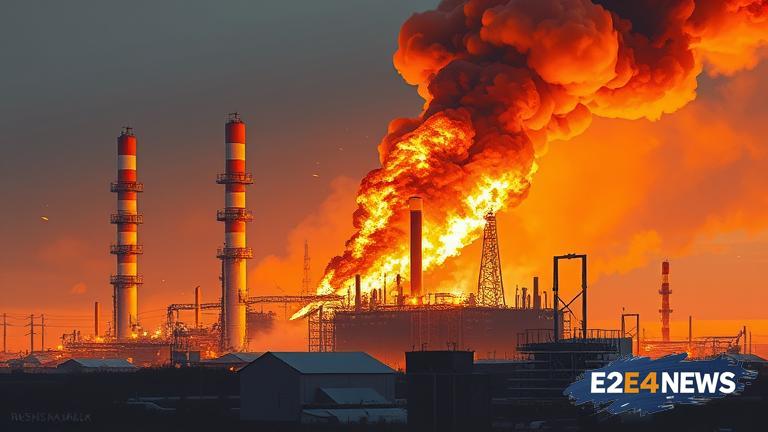A massive fire that broke out at Russia’s Rostov oil refinery has finally been extinguished, nearly a week after a Ukrainian drone attack sparked the blaze. The fire, which started on August 20, had been burning for six days, causing significant damage to the refinery and disrupting oil production. The Ukrainian military claimed responsibility for the drone attack, which they said was a targeted strike against Russian oil infrastructure. The Rostov oil refinery is one of the largest in Russia, producing over 10 million tons of oil products per year. The fire had been burning out of control, with flames reaching as high as 10 meters and thick black smoke billowing into the air. Emergency services had been working tirelessly to bring the fire under control, using specialized equipment and techniques to combat the blaze. Despite their efforts, the fire had continued to spread, fueled by the highly flammable oil and gas stored at the refinery. The Ukrainian drone attack had targeted the refinery’s storage tanks, causing a massive explosion and fire. The attack was widely condemned by Russian officials, who accused Ukraine of engaging in ‘terrorist’ activities. The Russian military had responded to the attack by launching a series of airstrikes against Ukrainian targets, escalating tensions between the two countries. The fire at the Rostov oil refinery had significant implications for Russia’s oil industry, with production at the refinery expected to be disrupted for several weeks. The refinery’s owners had announced plans to repair and rebuild the damaged facilities, but the process was expected to take several months. The Ukrainian drone attack had also raised concerns about the security of Russia’s oil infrastructure, with many experts warning that similar attacks could be launched in the future. The Russian government had vowed to take steps to protect its oil facilities, including increasing security measures and deploying additional troops to guard the refineries. The fire at the Rostov oil refinery had also had a significant impact on the local environment, with air and water pollution reported in the surrounding area. The Russian authorities had launched an investigation into the fire, with a team of experts working to determine the cause of the blaze and assess the damage. The investigation was expected to take several weeks, with the results to be made public once completed. The Ukrainian drone attack had been widely condemned by the international community, with many countries calling for an end to the violence and a return to diplomatic negotiations. The attack had also raised concerns about the use of drones in warfare, with many experts warning that the technology could be used to launch similar attacks in the future. The fire at the Rostov oil refinery had been a significant setback for Russia’s oil industry, but the country’s officials had vowed to rebuild and recover from the damage. The incident had also highlighted the need for increased security measures to protect critical infrastructure, including oil refineries and other industrial facilities.
